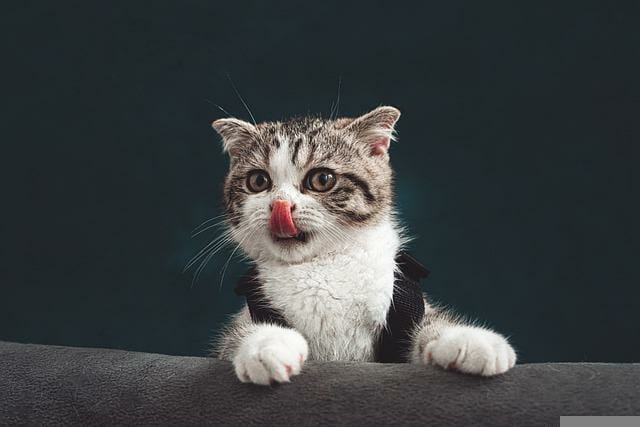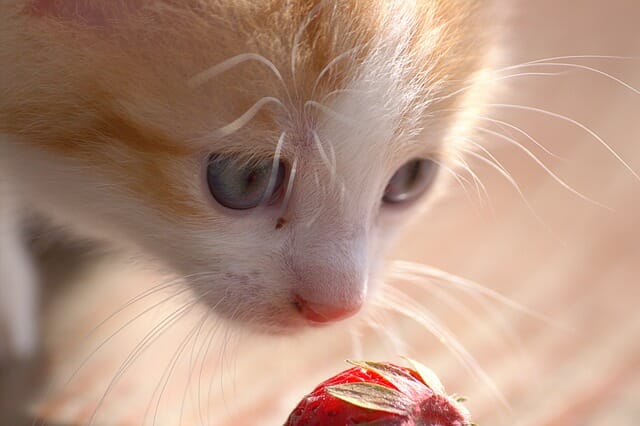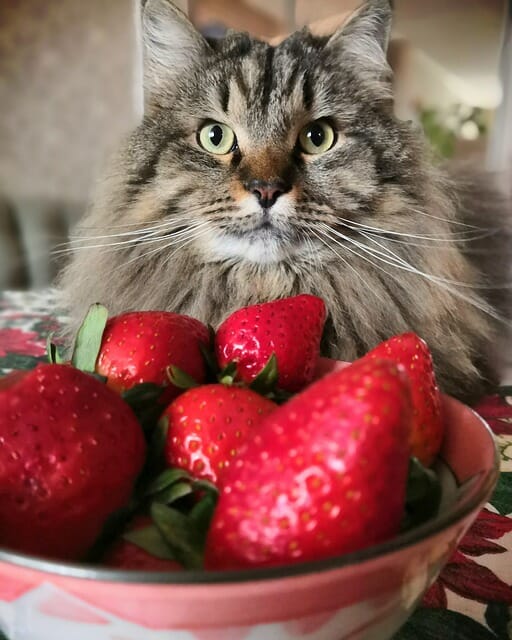Can Cat Eat Strawberry: Strawberries as Part of Cat’s Diet
Yes, cats can eat strawberries, but they are not a common part of a cat’s diet and are not nutritionally necessary. However, strawberries are not toxic to cats and can be used as an occasional treat in moderation. When feeding strawberries to your cat, it’s important to do so in small quantities and to cut them into small pieces to avoid choking hazards.
Table of Contents
Strawberries and Cats


Strawberry Leaves
Strawberry leaves are generally considered safe for cats to eat in small amounts. However, it’s important to note that some cats may have digestive issues or allergies to certain plants. So, it’s best to introduce new foods gradually and monitor your cat for any adverse reactions.
If you offer your cat some strawberry leaves, ensure they are thoroughly washed and remove any stems or other parts of the plant that be difficult for your cat to digest. It’s also a good idea to chop the leaves into small pieces to prevent choking.
Strawberry Yogurt
Strawberry yogurt may contain added sugar and other ingredients unsuitable for a cat’s digestive system. Generally, it’s best to avoid feeding cats human foods such as strawberry yogurt, as it may lead to digestive issues or other health problems.
Instead, consider providing your cat with high-quality, nutritionally complete cat food to meet its dietary needs. For example, if you want a treat to offer your cat, many commercial cat treats are formulated to be safe and healthy for cats to consume.
Strawberry Ice Cream
Strawberry ice cream is unsuitable for cats as it contains sugar, artificial flavorings, and other ingredients not part of a cat’s natural diet. Additionally, cats are lactose intolerant, which means they have difficulty digesting dairy products and may experience gastrointestinal upset if consumed.
Dried Strawberries
Small amounts of dried strawberries are generally safe for cats as an occasional treat. However, it’s important to remember that cats are obligate carnivores, and their diet should mainly consist of animal protein. Therefore, fruits and vegetables should only make up a small part of their diet.
When feeding your cat dried strawberries, make sure they are plain and do not contain any added sugar or other ingredients that may harm your cat’s health. Also, remember that dried fruits are higher in sugar and calories than fresh fruits, so it’s important to feed them to your cat in moderation.
Strawberry Jam or Syrup
Giving your cat strawberry jam or syrup is not recommended, as these products contain high amounts of sugar and other additives not part of a cat’s natural diet. Consuming large amounts of sugar can cause obesity, diabetes, and other cat health problems.
Furthermore, most commercial jams and syrups contain artificial sweeteners like xylitol or erythritol, which are extremely toxic to cats and can cause rapid insulin release, leading to hypoglycemia or low blood sugar.
Benefits of Strawberries to Your Cat


Rich in Antioxidants
Strawberries are rich in antioxidants, which are beneficial compounds that help protect against cellular damage caused by free radicals. Free radicals are unstable molecules that can cause damage to cells and contribute to developing diseases like cancer, heart disease, and arthritis.
Antioxidants, like those found in strawberries, help neutralize free radicals and prevent them from causing damage to cells. Strawberries are particularly rich in vitamin C, a powerful antioxidant that can boost your cat’s immune system and promote overall health.
Anti-Inflammatory Properties
Strawberries contain compounds with anti-inflammatory properties. Inflammation is a normal part of the body’s immune response, but chronic inflammation can contribute to various health problems, including heart disease, cancer, and arthritis.
Some of the compounds found in strawberries, such as anthocyanins and ellagic acid, have been shown to have anti-inflammatory effects on the body. These compounds can help reduce inflammation and promote overall health.
Good Source of Fiber
Strawberries are a good source of dietary fiber, which can benefit your cat’s digestive health. Fiber is a carbohydrate that the body cannot digest, and it helps regulate bowel movements and promote the growth of healthy gut bacteria.
Incorporating fiber-rich foods like strawberries into your cat’s diet can help prevent constipation and promote regular bowel movements. However, it’s important to remember that cats are obligate carnivores, and their digestive system is adapted to a diet high in animal protein and low in carbohydrates.
Low in Calories
Strawberries are low in calories and fat, which makes them a good option for cats that are overweight or prone to obesity. Obesity is a common health problem in cats, and it can increase the risk of developing other health problems like diabetes, heart disease, and arthritis.
Incorporating small amounts of low-calorie foods, like strawberries, into your cat’s diet can help them maintain a healthy weight and reduce the risk of obesity-related health problems. However, it’s important to remember that cats are obligate carnivores, and their diet should mainly consist of animal protein.
Good Source of Vitamins and Minerals
- Vitamin C: According to Healthline, strawberries are a rich source of vitamin C, an antioxidant that can help boost your cat’s immune system and promote overall health.
- Potassium: Strawberries are also a good source of potassium, which is important for regulating blood pressure and maintaining proper fluid balance.
- Magnesium: Magnesium is an essential mineral important for many bodily functions, including bone health, muscle, and nerve function. Strawberries contain a moderate amount of magnesium.
- Folate: Folate is a B vitamin important for cell growth and development. Strawberries are a good source of folate.
Risks of Strawberries to Your Cat
Allergic Reactions
Like any food, some cats may have an allergic reaction to strawberries. A protein usually causes allergic reactions in the food, triggering an immune system response in the cat’s body. Symptoms of an allergic reaction to strawberries may include itching or scratching, swelling of the face, lips, or tongue, hives or rashes, difficulty breathing or wheezing, and vomiting or diarrhea.
If your cat displays any of these symptoms after eating strawberries, stop giving them the fruit and contact your veterinarian. Your veterinarian can help determine if your cat is allergic to strawberries and recommend an appropriate treatment plan.
Digestive Upset
Feeding your cat too many strawberries or introducing them too quickly into their diet can cause digestive upset, including diarrhea, vomiting, or stomach discomfort. This is because cats are obligate carnivores, and their digestive systems are designed to process and absorb nutrients from animal protein.


If you decide to feed your cat strawberries, it’s important to introduce them gradually and in small amounts to avoid digestive upset. Start with a small piece of strawberry and monitor your cat’s response. If your cat tolerates it well, you can gradually increase it over time. However, if you notice any signs of digestive upset, such as vomiting or diarrhea, stop feeding strawberries and consult your veterinarian.
Pesticides
Pesticides are chemicals used to control crops’ pests, weeds, and diseases. Unfortunately, many strawberries and other fruits are treated with pesticides, which can harm cats if ingested. Some pesticides can cause digestive upset, while others can be toxic and potentially fatal.
To reduce your cat’s exposure to pesticides, it’s important to choose organic strawberries whenever possible. Organic strawberries are grown without synthetic pesticides, herbicides, or fertilizers. Additionally, you can wash strawberries thoroughly before feeding them to your cat to help remove any pesticide residue.
Obesity
While strawberries are low in calories and can be a healthy treat for cats, it’s important to remember that overfeeding any treats, including strawberries, can contribute to weight gain and obesity. Obesity is a common health problem in cats, leading to various health issues, including diabetes, arthritis, and cardiovascular disease.
To avoid overfeeding your cat, it’s important to limit the number of strawberries and other treats that you give them. Treats should comprise 10% of your cat’s daily caloric intake. You can also consider using fresh strawberries as a healthy alternative to high-calorie cat treats or adding variety to your cat’s diet.
Dental Problems
Feeding your cat strawberries, or any other food, does not pose a significant risk for dental problems. However, if your cat already has dental issues, such as tooth decay or gum disease, feeding them hard or crunchy foods like strawberries may exacerbate the problem.
If your cat has dental problems, working with your veterinarian to develop an appropriate treatment plan is important. This may include a dental cleaning or other interventions to address existing dental issues. Your veterinarian may also recommend a specific diet or treat formulated to promote dental health.
